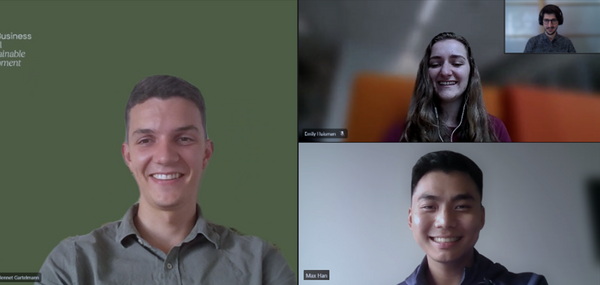My WBCSD Internship: Journey to a Nature-Positive Future

This summer, I was incredibly honored to be the first undergraduate from Yale to work as a Nature-based Solutions Intern at the World Business Council for Sustainable Development (WBCSD), with the invaluable support of Yale’s Center for Business and the Environment (CBEY). Even though my base was the New York office, the globalized nature of WBCSD and its Nature Action team had me collaborating with colleagues across Europe.
WBCSD's unique stance, which allows it to both support and influence its member companies—including giants like Apple, IKEA, and Google—piqued my interest. I aspired to engage with these industry leaders, aiming to gauge our current position in minimizing the business world's ecological footprint. I also wanted to bring my background in environmental justice to WBCSD and its initiatives.
I was particularly interested in the Nature Action track given my lived experiences growing up in Southeast Asia. Growing up in a small town in the countryside of Malaysia, I was surrounded by nature and understood its significance to my local communities. With the rise of corporate land grabs in Borneo Malaysia for carbon credits, I was determined to understand the nature-based solutions (NbS) landscape and seek different approaches to safeguard our precious ecosystems.
During my time at WBCSD, I was fortunate to have an enriching and safe learning environment, largely owing to the guidance of my manager, Peter Beare. Peter’s kindness and patience made him not just a manager, but a mentor too. He was intentional about my personal and professional development, being generous with time and constructive feedback during our weekly check-ins. I will always remember our meaningful conversations from effective stakeholder engagement within the NbS space to considerations for graduate school. The supportive atmosphere extended to my colleagues, who offered invaluable insights into their work across food sovereignty, water stewardship, and climate action. This allowed me a broader understanding of climate issues and initiatives across Europe.
Here are three insights I drew from my internship:
- Business sectors need to become nature-positive.
Nature and humanity are inextricably linked. According to the United Nations, forests support the livelihoods of over 1.6 billion people. From a broader economic perspective, nature underpins half of the global Gross Domestic Product (GDP) and yet, we are facing a mass species extinction.
We need to act now. Business leaders need to move beyond a sole focus on climate and focus on protecting nature and biodiversity too. Some effective actions include seeking sound nature-based solutions, meaningfully engaging with local communities within forests, and making nature-positive investments. A nature-positive investment involves intentionally integrating practices that maintain biodiversity, support ecosystem services, and promote regenerative use of resources into core business operations.
As we are already at a tipping point, becoming nature-positive is now a responsibility toward creating a just and liveable world.
- The NbS space is developing rapidly.
According to the United Nations Environmental Assembly, nature-based solutions are “actions to protect, conserve, restore, sustainably use and manage natural or modified terrestrial, freshwater, coastal and marine ecosystems". This can involve utilizing the ecosystem services of natural resources for climate solutions. For instance, planting mangroves to prevent coastal erosion rather than carbon-intensive infrastructure such as sea walls. Studies indicate that these nature-centric strategies could contribute to 37% of the required mitigation by 2030 to meet the Paris Agreement's objectives.
At WBCSD, I was exposed to an overview of the global stakeholders and initiatives for nature-based solutions. There are now many frameworks in development to integrate considerations and impacts on nature into business activities, such as the Taskforce on Nature-related Financial Disclosures.
- Meaningful stakeholder engagement is crucial.
I believe the best environmentalists speak the language of every stakeholder. Having seen how fragmented the global NbS ecosystem can be, I saw the need for increased coordination and collaboration among stakeholders.
One must learn to communicate effectively with business leaders, policymakers, and particularly local communities to implement nature-based solutions. With meaningful community consultations, initiatives risk greenwashing and co-opting existing local solutions.
I’m incredibly grateful to WBCSD and CBEY for investing in my growth during this internship.
This industry experience complemented my academic experiences at Yale, allowing me to critically understand the bridge between theory and practical solutions. I also plan to implement my insights back home in my grassroots youth movement and nonprofit, Youths United for Earth (YUFE). Our work aligns with protecting natural resources and taking climate action, so I hope to utilize my network to bring a positive impact within Southeast Asia.
